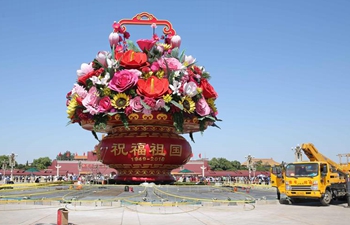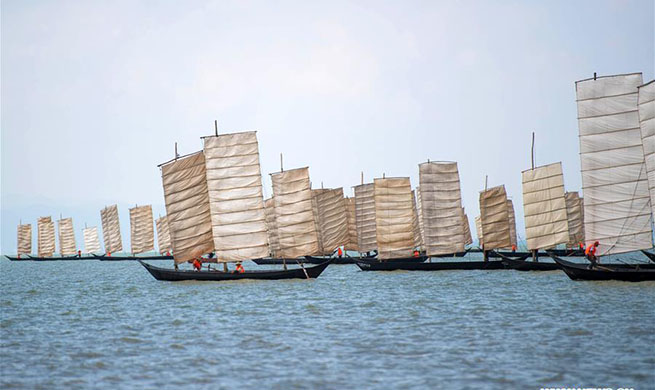MOSCOW, Sept. 23 (Xinhua) -- The shopping list of many Chinese families during the upcoming Mid-Autumn Festival and the National Day holidays might possibly include jewelry. This translates as "precious opportunities" for Russian state-owned diamond miner Alrosa.
"We pin high hopes on the Chinese market," said Sergei Ivanov, CEO of Alrosa, which last year did a survey showing that 86 percent of the Chinese respondents planned to buy at least one diamond ornament this year.
Chinese families are ascending the financial ladder and have an increasing desire for jewelry and other high-end products, according to him.
Alrosa, the world's leading diamond miner, has established long-term partnerships with six major Chinese jewelry dealers and its sales revenue grew 18 percent year on year in 2017, Ivanov said.
"We expect more cooperation with Chinese partners as we have high-quality Russian diamonds and excellent cutting expertise," he said, adding that last year Alrosa and Chinese partners experimented with making payments in ruble, which significantly simplified the transaction process.
Russia's largest petrochemicals company SIBUR also sees great potential in cooperation with China, according to its chairman of the management board, Dmitry Konov.
The two countries are highly complementary in oil and gas production and processing, and China needs an increasing amount of oil and gas supply alongside their other by-products, he said.
Konov also noted that China is replacing coal with natural gas and the petrochemical industry is a pillar of China's economy.
"SIBUR is determined to establish long-term partnership with Chinese counterparts as we see broad prospects," he said.
The Belt and Road Initiative proposed by Chinese President Xi Jinping will help improve logistics routes in Eurasia and SIBUR has set up factories and a logistics center along the Silk Road Economic Belt, said Konov.
About 90 percent of SIBUR's products are shipped by train and the company keeps a close eye on the railway development, he said, hoping that Russian exports of petrochemicals to China will significantly grow after the transportation infrastructure is overhauled.
Russia's Far East urgently needs construction or modernization of railways, highways and bridges, and Chinese enterprises can actively participate in it, said Zhang Zongyan, president of China Railway Group Limited (CREC).
During the fourth Eastern Economic Forum in Russia's Vladivostok earlier this month, representatives of CREC, the Russian Ministry of Transport, the Ministry for the Development of the Russian Far East, Russian Railways and Vnesheconombank discussed cooperation in infrastructure, logistics and investment.
Zhang said China Railway Eryuan Engineering Group, a subsidiary of CREC, has completed the compiling of all the design documents of the Moscow-Kazan high-speed railway and submitted them to the Russian side for review.
China and Russia are at different stages of infrastructure development with different technologies, expertise and industries. This in turn opens room for added cooperation between enterprises of the two countries, Zhang said.
Chinese and Russian enterprises are also planning to build a cableway for tourists over the Heilongjiang River, known as the Amur River in Russia, which separates Russia's Far East with China's northern Heilongjiang Province.
Vasily Orlov,?acting governor of Russia's Amur Region, said he hopes the project will proceed rapidly and he expects a surge in the number of tourists by the completion of the cableway and consequent economic prosperity across the border.
Firms of both countries are gearing up to strengthen cooperation as Xi and Russian President Vladimir Putin expressed their firm determination to promote bilateral ties at a meeting in Vladivostok earlier this month.
"The close cooperation with China is very important for Russia. It is important for us to explore the Chinese market and proactively participate in the Belt and Road Initiative," said Andrei Ostrovsky, deputy director of the Institute of Far Eastern Studies of the Russian Academy of Sciences.
He said Russia, by riding on the Chinese initiative, will be able to better improve its infrastructure, especially in the Far East, which will in turn create better conditions for the bilateral economic and trade cooperation in the long run.

















